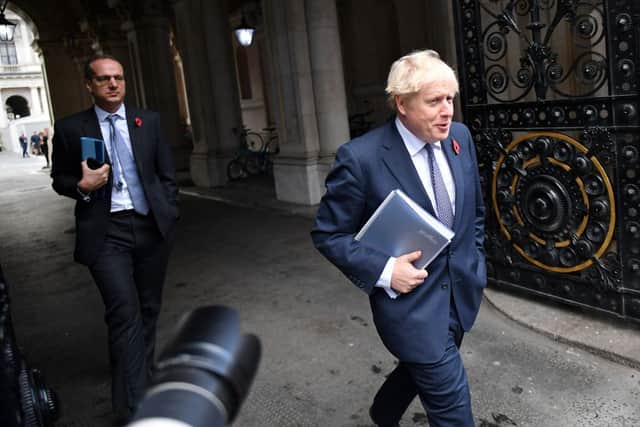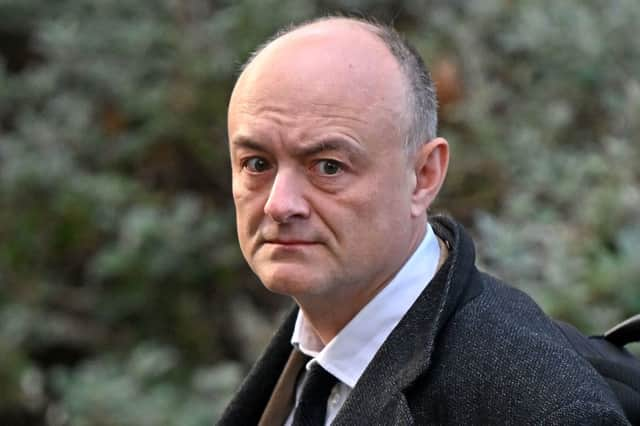Covid-19 Inquiry: What Boris Johnson said when lockdown started and pandemic timeline
and live on Freeview channel 276
When the Covid-19 pandemic hit UK shores, it wasn't long before we found ourselves stuck in our homes, working from our kitchens and learning to bake sourdough.
Time has flown by in the past three and a half years, and yet Covid remains somewhat in the forefront of the public conscience. From continued working from home to vaccines and self-isolation, our very way of life has changed.
Advertisement
Hide AdAdvertisement
Hide AdOn March 23 2020, Prime Minister Boris Johnson announced that the United Kingdon would be going into lockdown. As the Covid-19 Inquiry unfolds, here's how things have panned out since the pandemic struck.


Boris Johnson announces national lockdown
On 23 March 2020 the Prime Minister announced the first lockdown, ordering people to “stay at home.” These measures legally came into force three days later on 26 March.
Plan for lifting lockdown announced
On 30 April, Mr Johnson announced that we had passed the peak of the pandemic and on 10 May he made a conditional plan for lifting the lockdown, advising those who couldn’t work from home to return to offices. On 1 June, a phased re-opening of schools began followed by non-essential shops in England on 15 June.
However, it was also at this time that Partygate took place...
Advertisement
Hide AdAdvertisement
Hide AdPartygate
On 20 May around 20 staff - including Boris and Carrie Johnson, as well as Dominic Cummings - attended the Downing Street garden for an event that included cheese and wine. Five days later, emails seen by ITV News in January 2022 showed the Prime Minister’s principal private secretary Martin Reynolds invited 100 members of staff to “socially distanced drinks in the No 10 garden”. Reynolds encouraged those attending to “bring your own booze”.
On 19 June, there was a gathering in No 10 Downing Street for Boris Johnson’s birthday. Up to 30 people were there to present the Prime Minister with a cake and sing ‘happy birthday’, according to ITV News.
Local lockdowns begin
On 23 June, relaxing of restrictions were implemented including easing of the two metre social distance rule.
On 4 July, the UK’s first local lockdown came into force in Leicester as pubs and restaurants reopened in England. On 3 August, the Eat Out to Help Out scheme began in the UK with theatres and bowling alleys opening again on 14 August. By 14 September, the ‘rule of six’ was implemented and on 22 September, new restrictions were announced in England with a return to working from home and a 10pm curfew.
Advertisement
Hide AdAdvertisement
Hide AdSecond lockdown announced
The three-tier Covid restrictions system began on 14 October in England and on 31 October the Prime Minister announced another lockdown, coming into effect on Bonfire Night (5 November). On 24 November, the Prime Minister announced that up to three households would be able to meet from 23 to 27 December and on 2 December the second lockdown ended, with a return of the three-tier system.
On 21 December, London and South East England were hit with Tier 4 stay at home restrictions with more areas included on Boxing Day.
Downing Street Christmas party
On 12 November there was a gathering in No 10 Downing Street flat and a gathering in No 10 Downing Street on the departure of a special adviser. Boris Johnson was said to have started this party. There was then a gathering on 15 December for a Christmas quiz, and a third gathering on 18 December, where Downing Street staff are believed to have held a Christmas party, with reports that dozens of people were at the event. Some attendees were said to have worn festive jumpers and exchanged Secret Santa gifts.


Third lockdown announced
In the new year of 2021, a third national lockdown was announced on 6 January. Hotel quarantine was implemented for travellers arriving in England on 15 February. On 8 March, primary and secondary schools reopened in England with stay at home remaining in place.
Advertisement
Hide AdAdvertisement
Hide AdRestrictions begin to lift
On 29 March, outdoor gatherings of six people or two households were allowed with sports facilities opening and people advised to stay local. By 12 April, non-essential shops like hairdressers and libraries reopen, as well as gyms, restaurants and pubs - but only outdoors.
On 17 May, 30 people were allowed to mix outdoors with a rule of six or two households allowed for indoor gatherings. Indoor pubs, cinemas and restaurants reopened, as well as up to 10,000 spectators able to attend football stadiums.
On 14 June, restrictions on weddings and funerals were abolished, and by 19 July most legal limits on social contact were removed in England and nightclubs reopened.
Plan B announced
On 14 September, Boris Johnson announced the winter strategy of Plan B, including face mask rules. This was implemented on 8 December in England, following the spread of the Omicron variant.
Advertisement
Hide AdAdvertisement
Hide AdOn 10 December, face masks were compulsory in most indoor public venues and on 15 December the NHS Covid pass became mandatory in specific settings such as nightclubs.
Living with Covid strategy
Plan B came to an end on 27 January 2022 and on 21 February Boris Johnson unveiled England’s living with Covid strategy, seeing the end of all Covid regulations including those that mandated lockdown and required people to self isolate if they tested positive.
What Boris Johnson said when lockdown began - full speech
The coronavirus is the biggest threat this country has faced for decades – and this country is not alone.
All over the world we are seeing the devastating impact of this invisible killer. And so tonight I want to update you on the latest steps we are taking to fight the disease and what you can do to help. And I want to begin by reminding you why the UK has been taking the approach that we have.
Advertisement
Hide AdAdvertisement
Hide AdWithout a huge national effort to halt the growth of this virus, there will come a moment when no health service in the world could possibly cope; because there won’t be enough ventilators, enough intensive care beds, enough doctors and nurses. And as we have seen elsewhere, in other countries that also have fantastic health care systems, that is the moment of real danger.
To put it simply, if too many people become seriously unwell at one time, the NHS will be unable to handle it - meaning more people are likely to die, not just from Coronavirus but from other illnesses as well.
So it’s vital to slow the spread of the disease. Because that is the way we reduce the number of people needing hospital treatment at any one time, so we can protect the NHS’s ability to cope - and save more lives.
And that’s why we have been asking people to stay at home during this pandemic. And though huge numbers are complying - and I thank you all - the time has now come for us all to do more.
Advertisement
Hide AdAdvertisement
Hide AdFrom this evening I must give the British people a very simple instruction - you must stay at home. Because the critical thing we must do is stop the disease spreading between households.
No Prime Minister wants to enact measures like this. I know the damage that this disruption is doing and will do to people’s lives, to their businesses and to their jobs.
That’s why we have produced a huge and unprecedented programme of support both for workers and for business. I can assure you that we will keep these restrictions under constant review. We will look again in three weeks, and relax them if the evidence shows we are able to.
But at present there are just no easy options. The way ahead is hard, and it is still true that many lives will sadly be lost. And yet it is also true that there is a clear way through.
Advertisement
Hide AdAdvertisement
Hide AdDay by day we are strengthening our amazing NHS with 7500 former clinicians now coming back to the service. With the time you buy - by simply staying at home - we are increasing our stocks of equipment.
We are accelerating our search for treatments. We are pioneering work on a vaccine. And we are buying millions of testing kits that will enable us to turn the tide on this invisible killer.
I want to thank everyone who is working flat out to beat the virus. Everyone from the supermarket staff to the transport workers to the carers to the nurses and doctors on the frontline.
But in this fight we can be in no doubt that each and every one of us is directly enlisted. Each and every one of us is now obliged to join together. To halt the spread of this disease.To protect our NHS and to save many many thousands of lives.
Advertisement
Hide AdAdvertisement
Hide AdI know that as they have in the past so many times, the people of this country will rise to that challenge. We will come through it stronger than ever. We will beat the coronavirus and we will beat it together.
Therefore I urge you at this moment of national emergency to stay at home, protect our NHS and save lives.
Comment Guidelines
National World encourages reader discussion on our stories. User feedback, insights and back-and-forth exchanges add a rich layer of context to reporting. Please review our Community Guidelines before commenting.
